Corporate
law
departments
have
elevated
the
legal
operations
profession
in
recent
years,
making
these
roles
central
to
their
ongoing
quest
for
ever-more
efficiency.
With
its
recent
launch
of
CounselLink+™,
LexisNexis
has
provided
a
new
tool
to
help
in-house
lawyers
and
legal
operations
professionals
meet
these
demands.
The
“+”
in
“CounselLink+”
refers
to
integration
—
users
of
the
system
now
have
access
to
all
of
their
organization’s
customizable
tech
stack,
as
well
as
all
of
the
additional
Lexis
products
they
subscribe
to,
with
one
password.
The
result
is
a
comprehensive
system
with
the
capability
to
organize
and
streamline
all
aspects
of
a
corporate
law
department’s
work.
Lexis
products
are
embedded
throughout
CounselLink+
—
its
Practical
Guidance
tool
is
integrated
into
the
contract
management
system
to
assist
with
templates
and
drafting,
for
one
example.
A
streamlined
work
intake
feature
also
allows
the
law
department
to
seamlessly
field
and
respond
to
requests
and
questions
from
the
full
business.
And
Lexis’
proprietary,
market-leading
AI
applications
are
thoughtfully
embedded
throughout
the
system
to
further
boost
efficiency.
These
integrations
enable
users
to
share
data
across
systems
far
more
easily
than
they
could
with
a
patchwork
of
tech
solutions
in
place.
This
in
turn
helps
them
find
new
efficiencies
in
creating
and
managing
contracts,
or
evaluating
legal
risks,
or
managing
matters
and
spending,
or
fielding
and
responding
to
enterprisewide
questions,
among
other
tasks.
The
unified
system
also
eases
the
process
of
tracking
all
of
the
law
department’s
contributions
—
and
presenting
this
data
to
showcase
its
value
to
the
organization
and
refine
its
operations.
It’s
a
system
that
will
add
conveniences,
ease
user
adoption,
and
bolster
tech-focused
legal
operations
professionals
and
end-user
lawyers
alike.
If
you’re
curious
about
this
product
and
would
like
to
book
a
demo,
you
can
do
so
here.
Or,
first,
you
can
read
on
for
a
tour
of
select
features
of
CounselLink+.
Getting
Started
The
CounselLink+
system’s
homescreen
provides
immediate
access
to
numerous
systems
and
products.
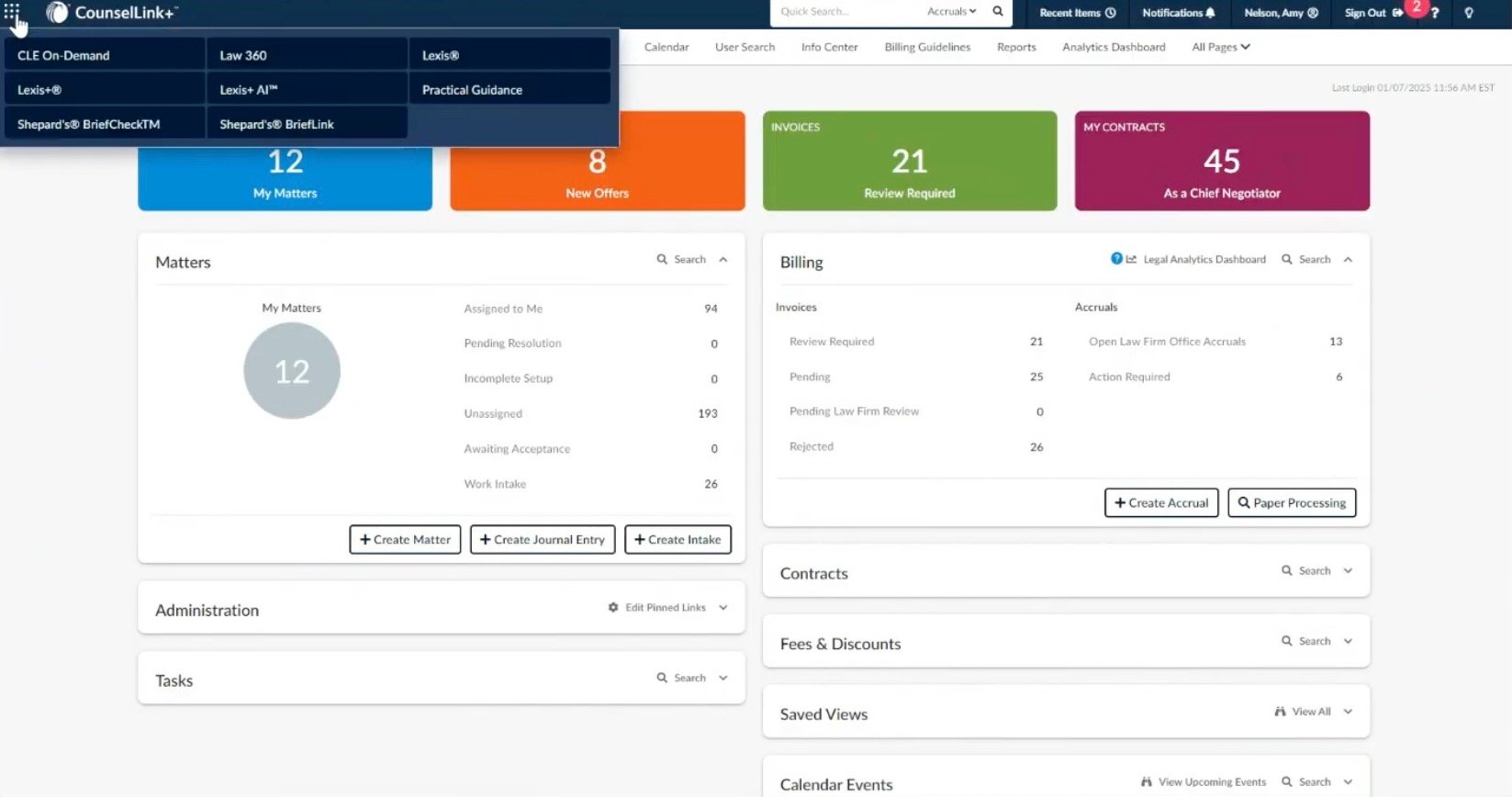
Internally,
one
click
will
take
you
to
all
of
your
systems
—
matter
or
work
management,
financial
management
including
eBilling,
vendor
management,
contract
lifecycle
management,
organizationwide
requests,
and
data
analytics.
CounselLink+
also
includes
one
click
access
to
any
other
Lexis
products
your
organization
subscribes
to,
including
Lexis+
AI,
Law360,
Practical
Guidance,
and
more.
This
means
that
your
research
system
is
incorporated
with
all
of
your
other
workflow
products,
removing
the
need
to
toggle
between
disparate
systems.
The
Work
Intake
System
CounselLink+
is
organized
into
matters,
and
each
matter
provides
a
comprehensive
overview
of
every
item
to
track
—
these
include
law
firm
relationships,
eBilling,
documents,
and
contracts.
Matters
can
be
generated
manually
or
imported
from
other
systems,
and
they
can
automatically
include
data
and
documents
through
API
functionality.
The
system
is
also
highly
configurable,
allowing
each
enterprise
to
customize
the
KPIs
it’s
following.
Once
a
matter
is
created,
it
takes
you
to
a
matter
portal
that
allows
you
to
view
all
of
its
related
documents
and
metrics.
Tabs
contain
exhaustive
detail
on
everything
from
budget
in
reserve
to
internal
stakeholders.
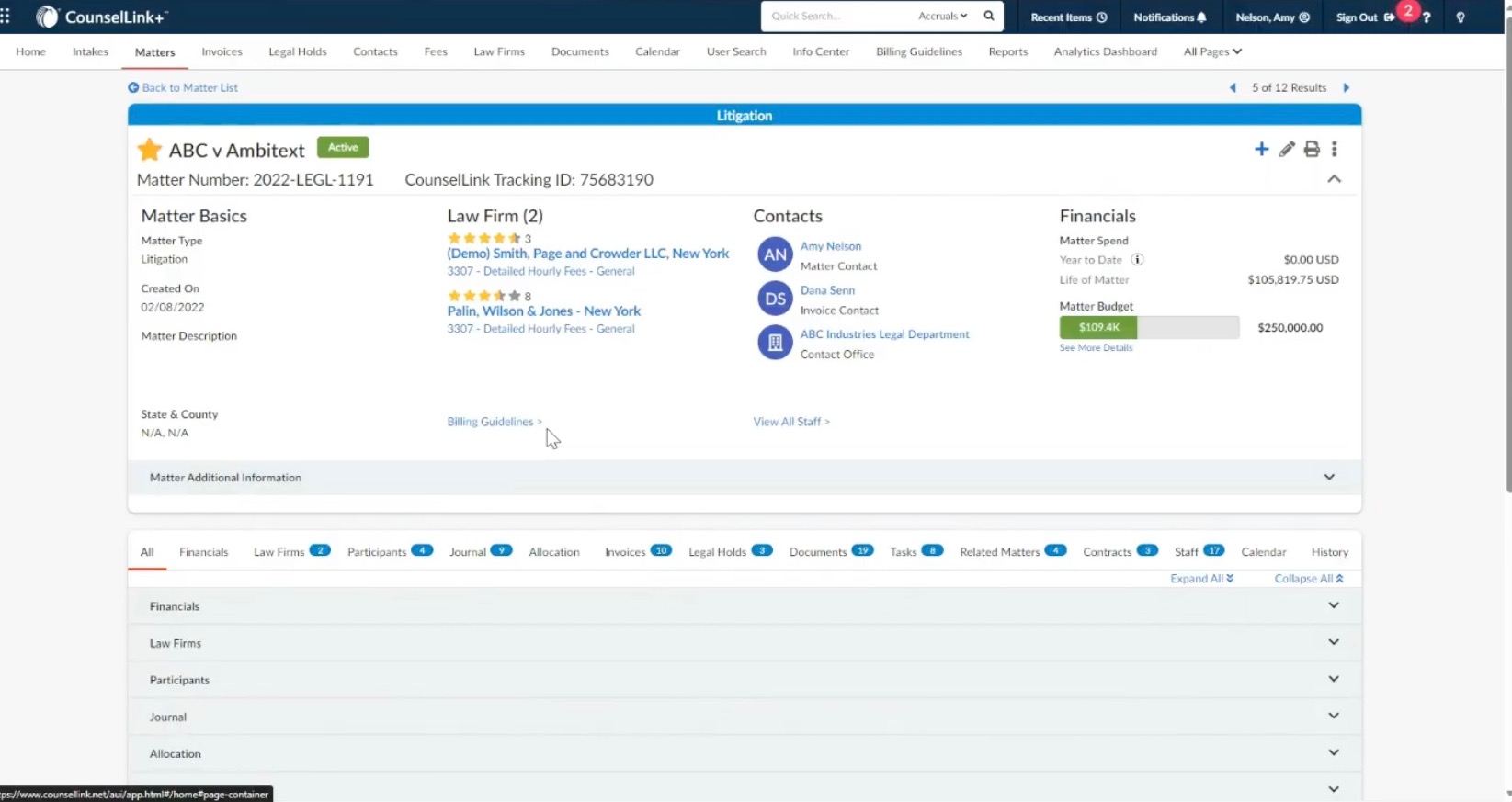
Matters
can
also
be
created
with
the
CounselLink+
feature
called
“Work
Intake.”
The
Work
Intake
system
allows
the
legal
department
to
share
a
customizable
form,
most
likely
on
the
company’s
intranet,
that
will
allow
anyone
in
the
organization
to
ask
a
question
or
make
a
request.
It’s
a
process
that
eliminates
the
need
to
chase
down
requests
in
the
form
of
voicemails,
emails,
and
other
contacts,
instead
bringing
them
all
into
one
standardized
system.
The
routing
of
the
form
is
also
customizable
—
employment-related
requests
can
go
to
an
employment
lawyer,
while
questions
about
a
vendor
can
go
to
the
legal
operations
team,
for
example.
Requests
may
simply
be
questions
that
are
asked
and
answered,
or
they
may
be
promoted
to
matters.
But
whatever
the
outcome,
the
CounselLink
system
will
track
all
of
the
work
the
legal
department
is
performing.
While
just
about
any
system
will
tell
you
high-level
metrics
like
number
of
cases
handled,
this
system
excels
in
tracking
all
of
the
work
a
legal
team
is
performing.
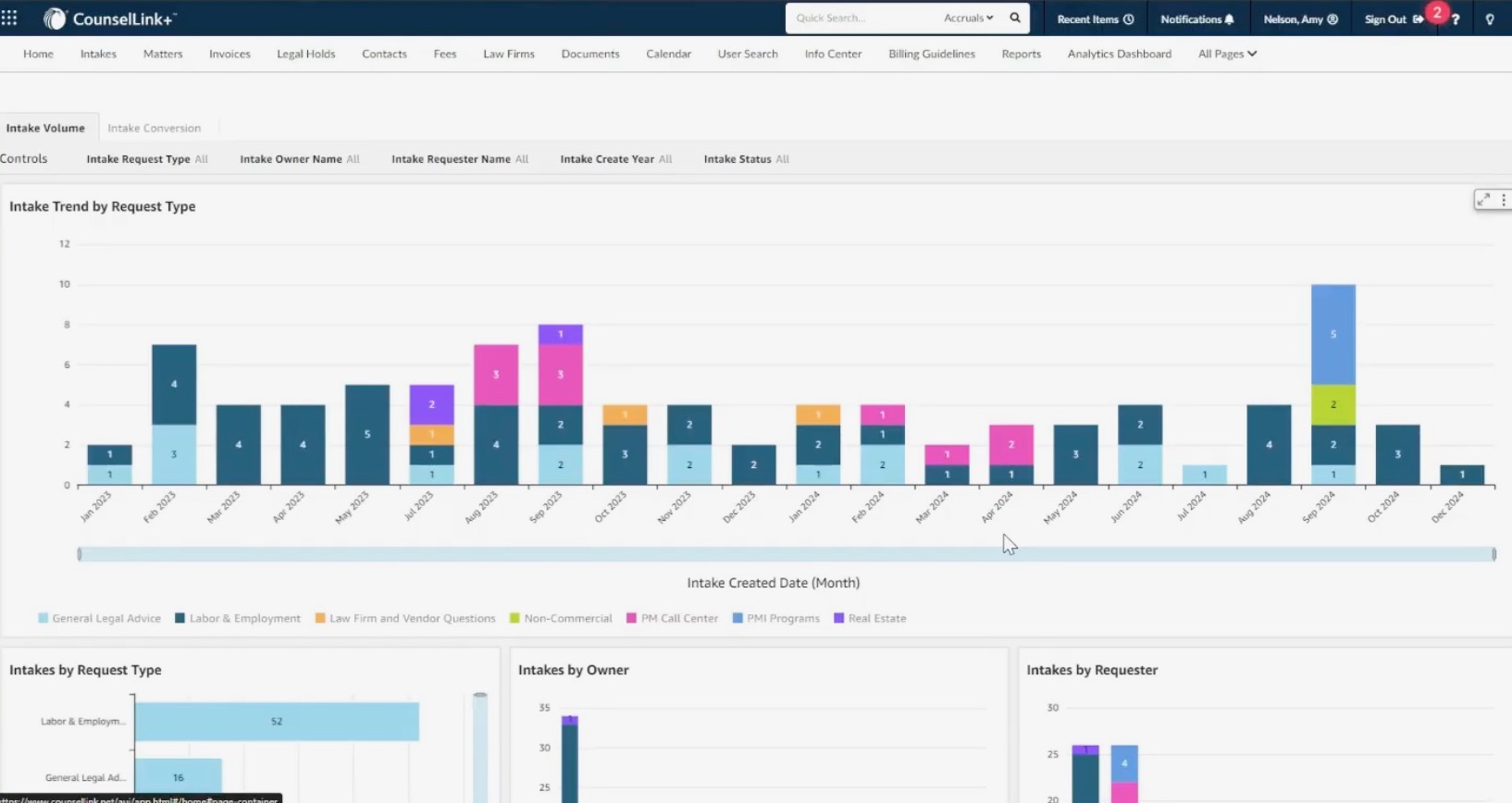
CounselLink+
will
track
all
of
the
questions
that
come
into
a
law
department
—
the
volume,
the
number
of
questions
that
are
converted
into
matters,
the
practice
area
of
each
inquiry,
and
more.
In
addition
to
demonstrating
value,
this
data
also
gives
the
law
department
the
opportunity
to
refine
its
processes
and
maximize
efficiency.
Work
Management
Once
the
work
intake
is
completed
and
a
matter
is
created,
CounselLink+
will
integrate
its
varied
aspects
into
one
easy
to
use
workspace.
One
work
management
section
allows
you
to
store
documents
and
contracts
in
one
location.
They
can
be
imported
directly
from
email,
or
added
through
an
upload
form.
The
system
also
integrates
with
document
management
software
like
iManage,
and
has
check-in/check-out
and
version
tracker
capabilities.
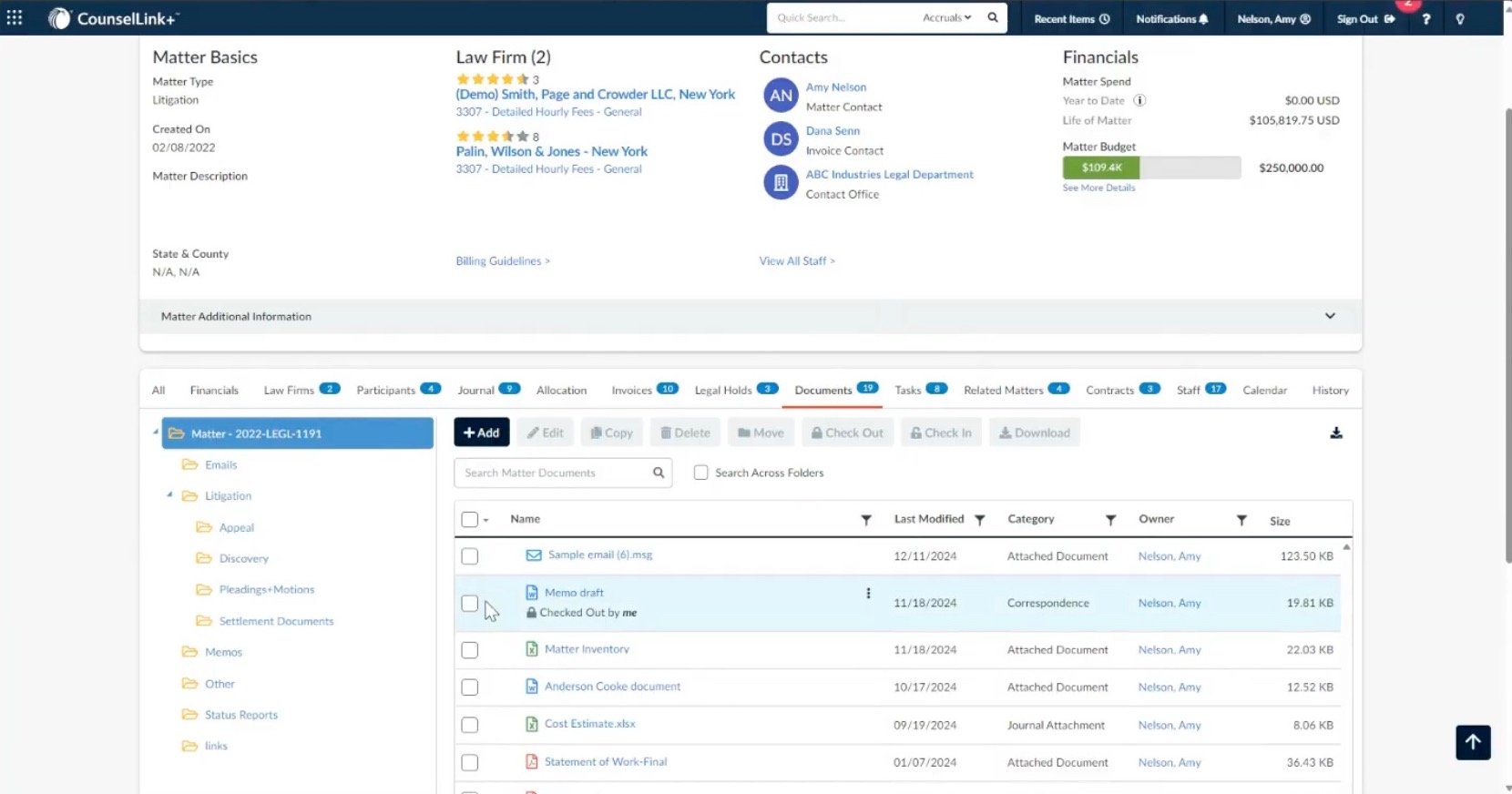
CounselLink+
users
can
control
access
to
each
document,
sharing
only
certain
ones
with
an
outside
law
firm,
for
example.
The
matter
file
also
tracks
workflow
with
an
intuitive
calendaring
and
task-management
system.
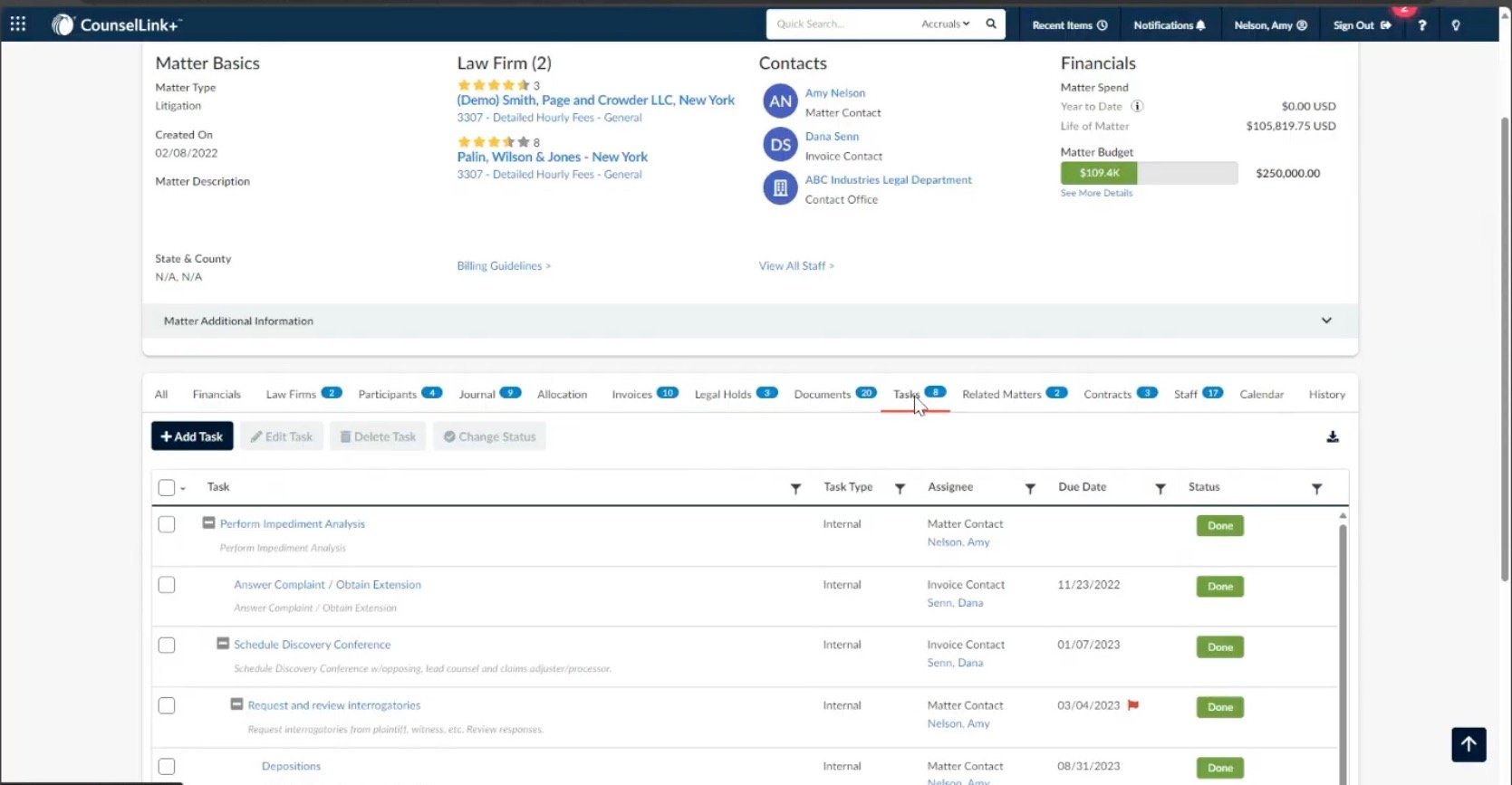
This
allows
seamless
collaboration
with
other
internal
users
and
external
users.
It
particularly
allows
law
departments
to
collaborate
with
outside
counsel
within
the
same
portal.
Outlook
Add-In
At
a
large
legal
department,
legal
operations
professionals
will
spend
most
of
their
time
in
the
dashboards,
digging
into
every
available
metric
to
seek
greater
efficiency.
Lawyers,
however,
are
often
working
in
applications
like
Outlook,
while
only
occasionally
utilizing
the
full
system.
That’s
why
CounselLink+
has
a
feature
that
will
meet
lawyers
where
they
are.
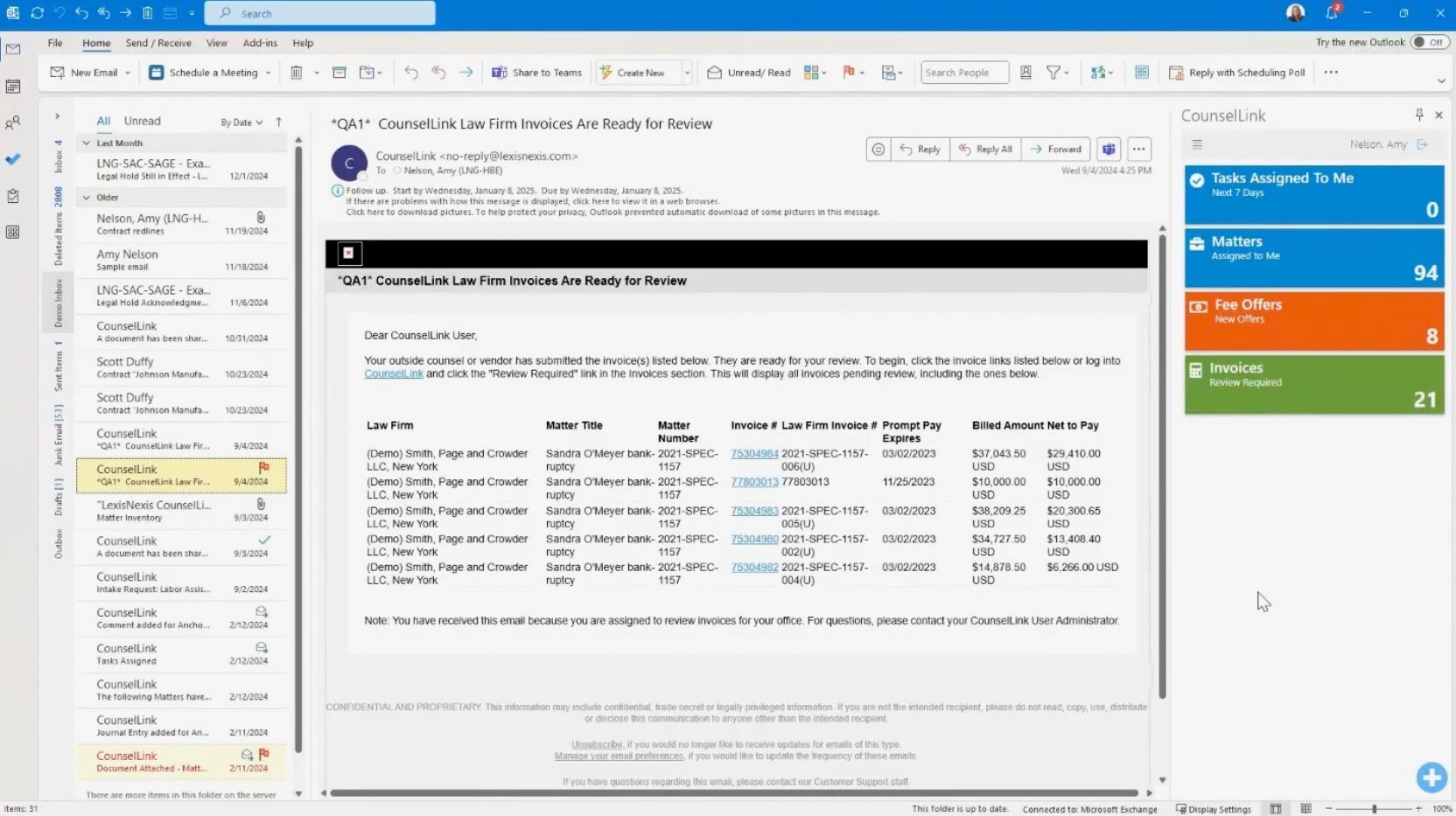
Any
matter
created
in
CounselLink+
will
create
a
mini-homepage
that
can
be
accessed
in
Outlook.
The
homepage
contains
all
of
the
matter
information
relevant
to
a
lawyer
assigned
to
work
on
it,
and
it
allows
lawyers
to
easily
scroll
between
matters
and
find
all
documents,
invoices,
and
other
data
a
matter
includes.
An
“Add
Journal
Entry”
field
is
particularly
popular
among
CounselLink’s
lawyer
end-users.
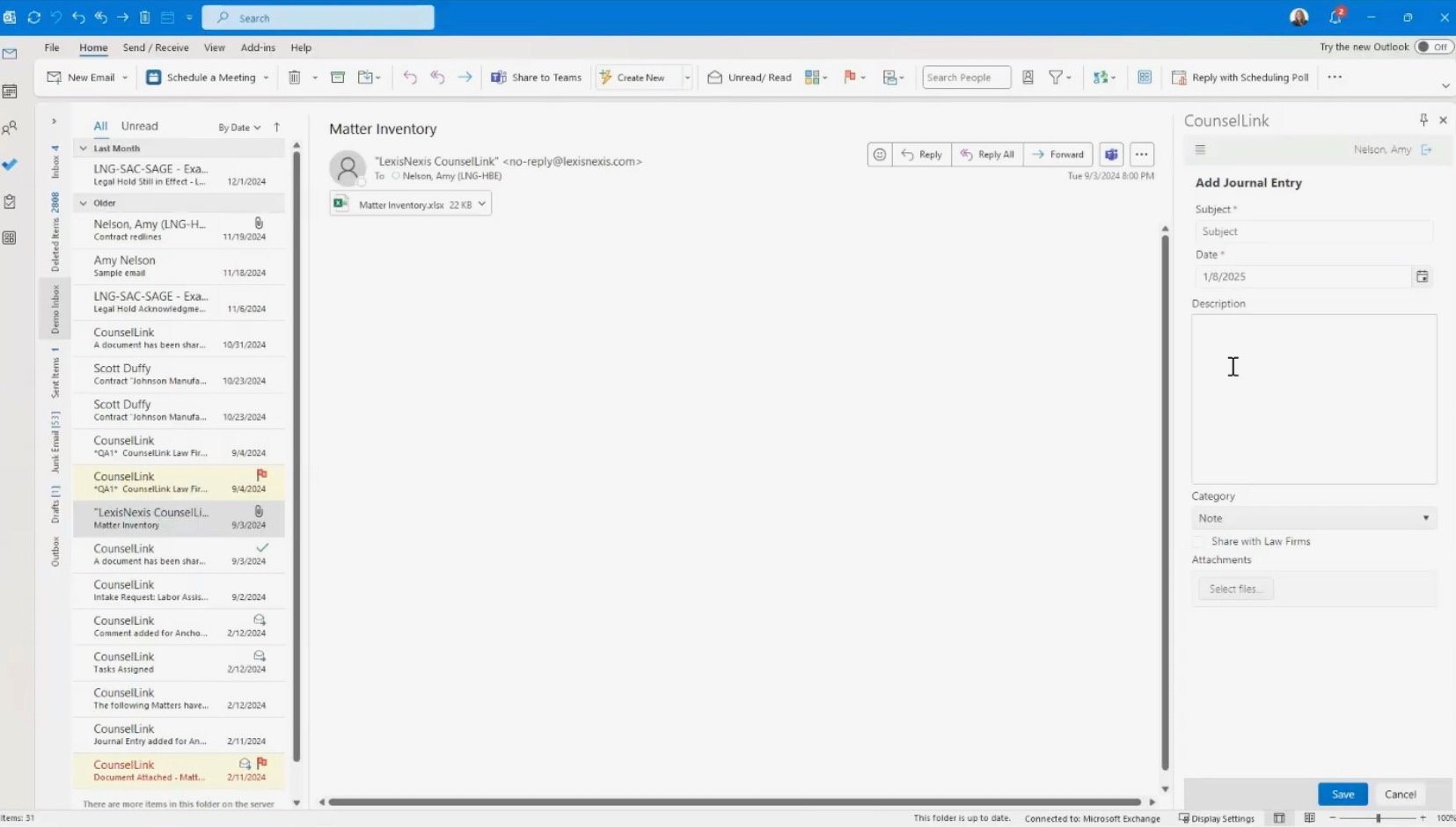
The
panel
(seen
at
the
right
above)
allows
lawyers
to
include
things
like
status
updates,
meeting
notes,
or
documents
that
will
be
attached
to
a
matter,
as
well
as
to
tag
other
users
to
bring
it
to
their
attention.
The
entry
will
be
reflected
in
the
main
CounselLink+
system,
but
the
end-user
lawyer
only
needs
to
create
it
in
Outlook.
It’s
a
process
that
reflects
seamless
user
adoption
for
any
lawyer
currently
using
Outlook.
AI-Powered
Bill
Review
Whether
your
law
firms
bill
hourly
or
through
AFAs,
CounselLink+
can
transform
the
widely
dreaded
task
of
bill
review.
To
populate
the
system,
law
firms
can
submit
invoices
directly
through
CounselLink+
at
no
cost.
Once
an
invoice
is
in
the
system,
a
proprietary
Smart
Review
functionality
will
examine
all
of
the
charges.
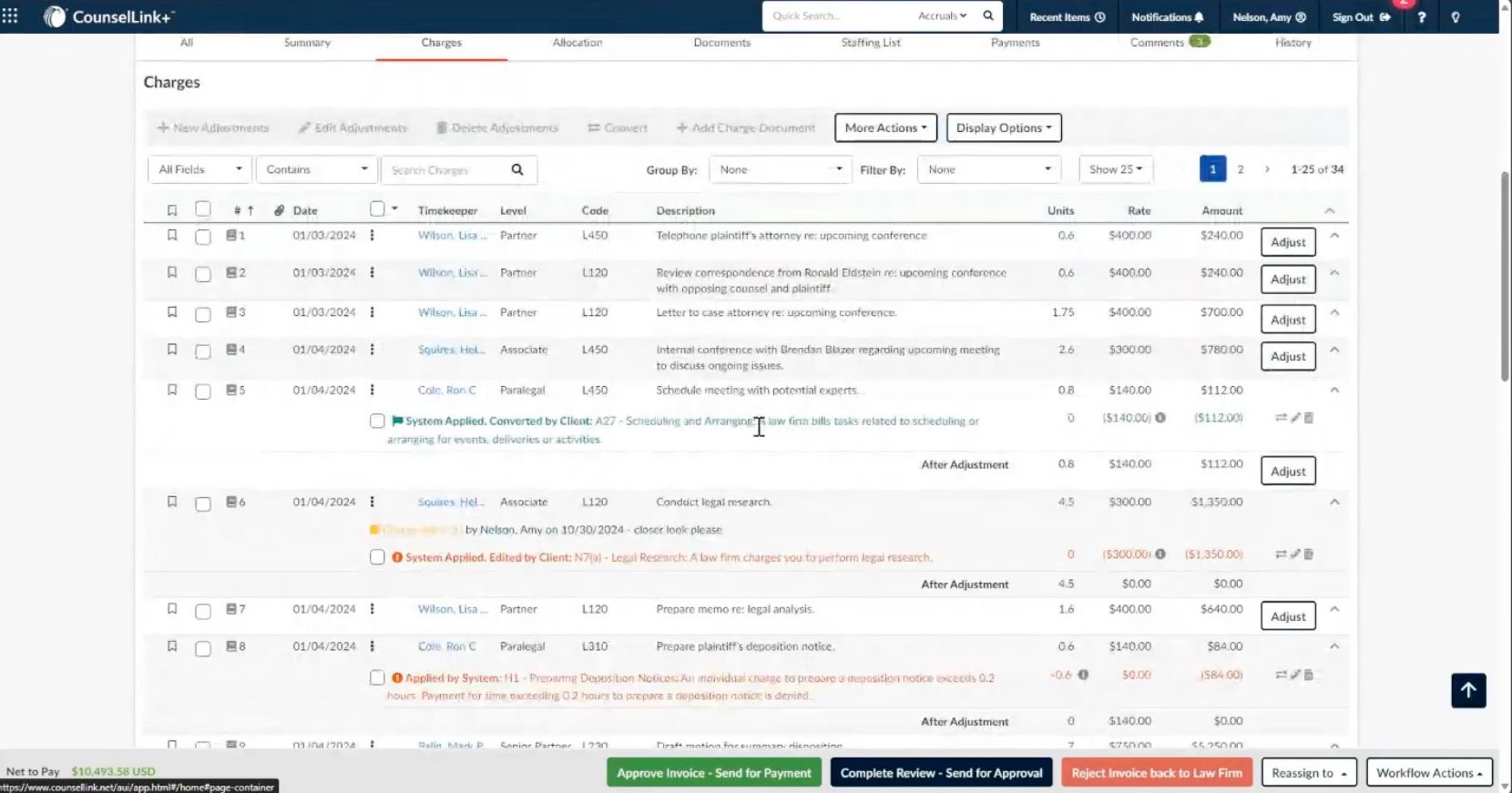
The
system
will
immediately
validate
the
invoice
and
reject
items
like
hours
billed
by
unknown
timekeepers.
CounselLink+
will
then
review
all
of
the
items
in
an
invoice,
and
call
out
certain
ones
for
additional
scrutiny.
It
flags
these
items
with
a
review
that
goes
far
beyond
just
UTBMS
codes
—
leveraging
AI
to
scrutinize
every
part
of
the
charge,
like
the
date,
the
level
of
timekeeper,
the
charge
text,
the
units,
and
the
rate.
In
the
example
above,
the
system
identified
a
line
item
coded
for
trial
and
hearing
attendance
where
its
description
indicated
it
was
billing
for
setting
up
a
meeting.
Every
CounselLink+
client
can
customize
the
rules
Smart
Review
uses
in
its
bill
review.
They
can
also
be
customized
for
different
types
of
matters
—
different
rules
for
IP
invoices
versus
those
for
litigation,
for
example.
CounselLink+
also
has
a
Combined
Invoice
Review
functionality
that
allows
it
to
review
multiple
invoices
at
once.
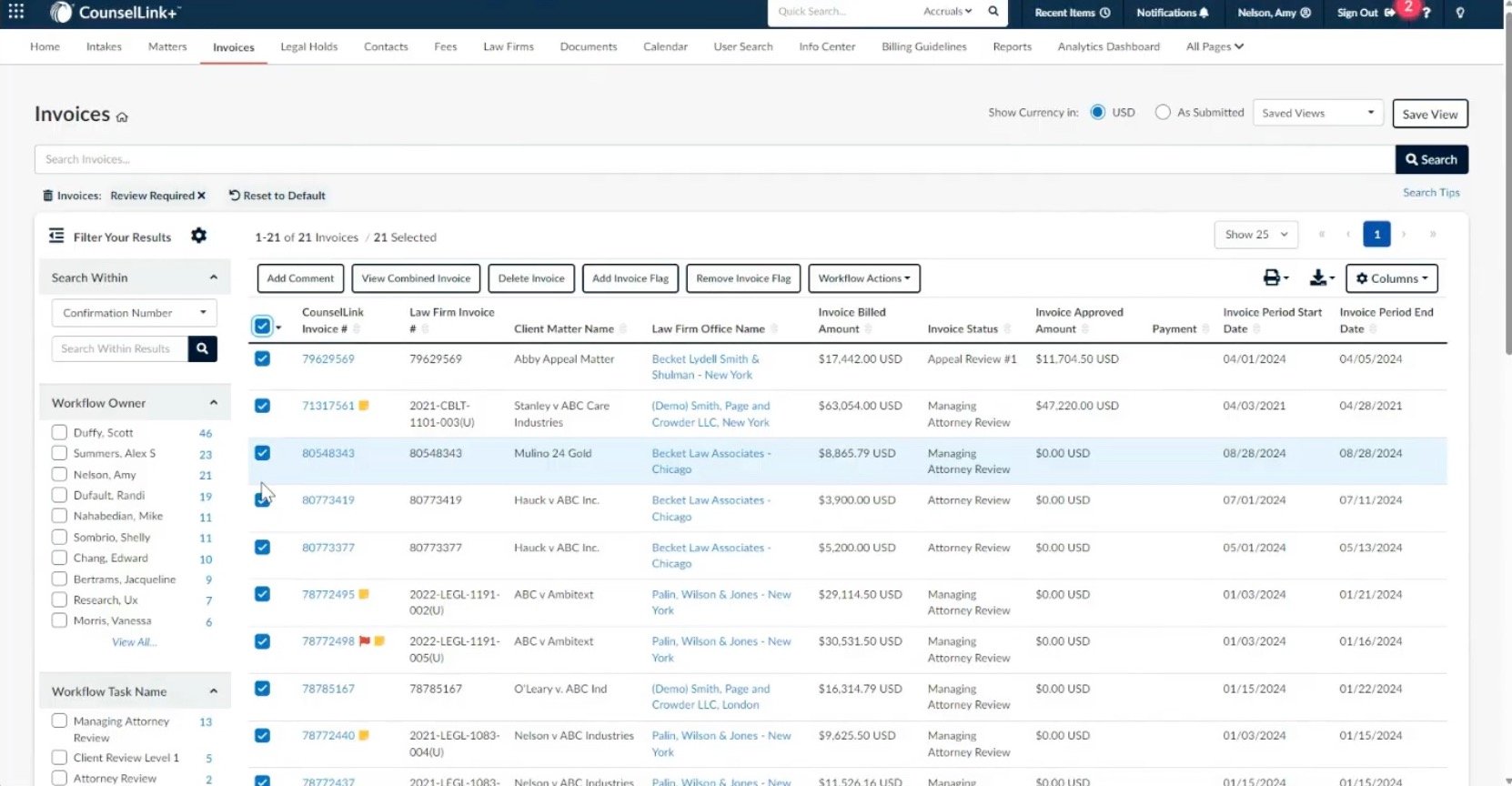
This
feature
allows
law
departments
with
a
high
volume
of
invoices
to
review
them
all
simultaneously,
as
opposed
to
opening
and
closing
each
one.
It
can
also
provide
in-depth
spend
analysis
on
a
particular
matter
—
quickly
seeing
how
much
of
a
particular
matter
was
handled
by
partners
versus
associates,
for
example.
To
manage
your
roster
of
law
firms,
CounselLink+
will
also
provide
a
360
degree
view
of
your
law
firm
relationships.
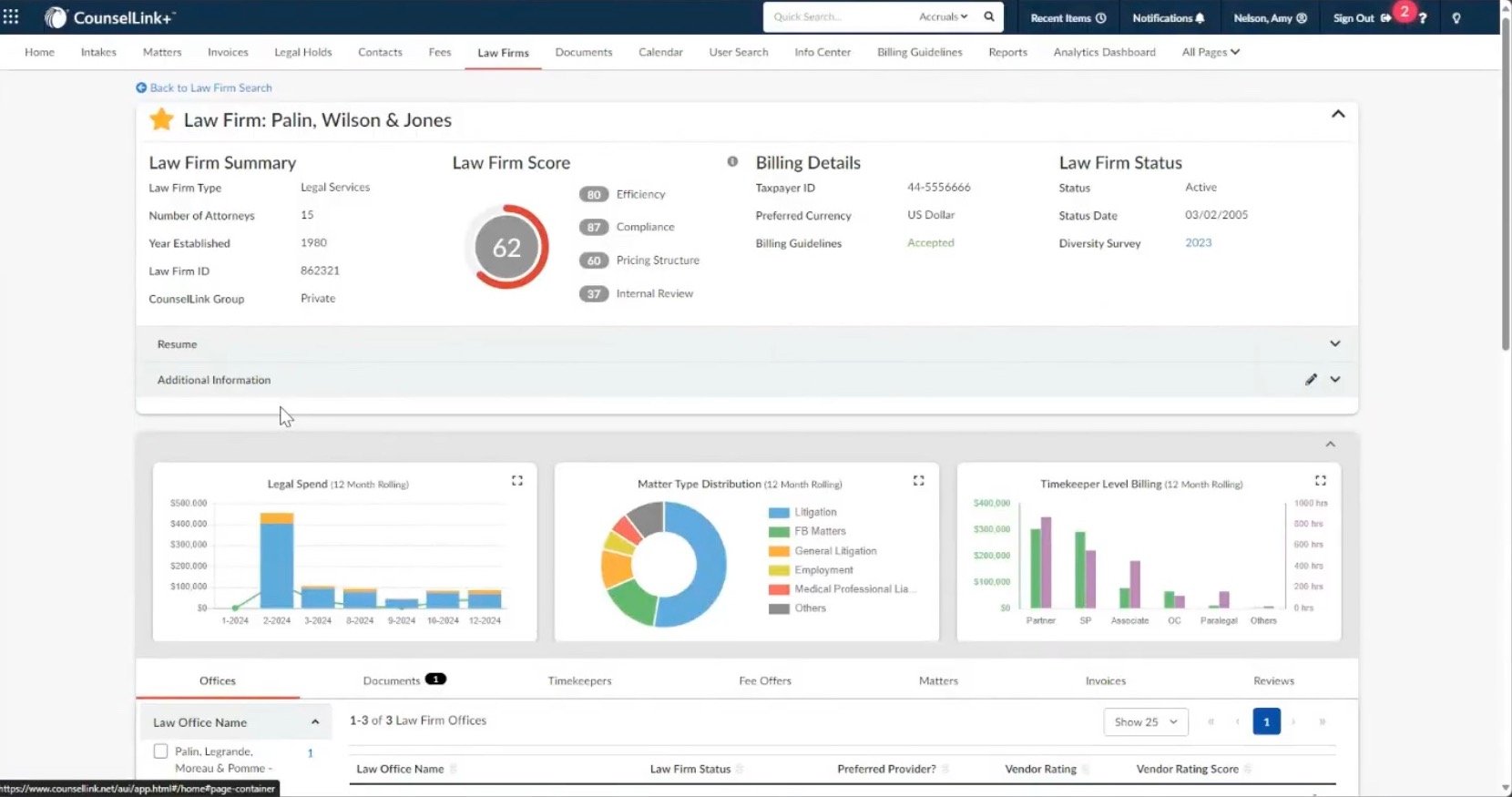
Law
firms
have
a
weighted
score
—
customizable
by
the
in-house
law
department.
The
system
also
maintains
a
law
firm
diversity
survey
and
can
track
timekeeper
diversity.
Each
corporate
client
can
leave
Yelp-style
reviews
of
their
law
firms
as
well,
to
be
maintained
in
the
internal
system.
The
internal
star
rating
can
be
incorporated
into
the
law
firm
score
as
well.
See
for
Yourself
An
article
like
this
can
only
scratch
the
surface
of
the
capabilities
of
a
program
like
CounselLink+.
If
you’re
curious
about
this
product
and
would
like
to
book
a
demo,
you
can
do
so
here.
And
stay
tuned
to
Above
the
Law
for
our
follow-up
article,
where
we’ll
dive
into
additional
CounselLink+
capabilities,
including
its
contract
lifecycle
management
integration.
 Staci
Staci




 Kathryn
Kathryn




 Chris
Chris













 Jill
Jill
